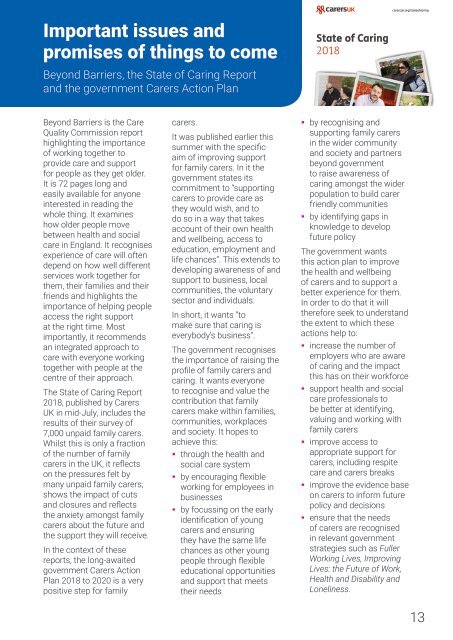CM Issue 12 2018 25.07.18 v1.0 HQ
Create successful ePaper yourself
Turn your PDF publications into a flip-book with our unique Google optimized e-Paper software.
carersuk.org/stateofcaring<br />
Important issues and<br />
promises of things to come<br />
State of Caring<br />
<strong>2018</strong><br />
Beyond Barriers, the State of Caring Report<br />
and the government Carers Action Plan<br />
Beyond Barriers is the Care<br />
Quality Commission report<br />
highlighting the importance<br />
of working together to<br />
provide care and support<br />
for people as they get older.<br />
It is 72 pages long and<br />
easily available for anyone<br />
interested in reading the<br />
whole thing. It examines<br />
how older people move<br />
between health and social<br />
care in England. It recognises<br />
experience of care will often<br />
depend on how well different<br />
services work together for<br />
them, their families and their<br />
friends and highlights the<br />
importance of helping people<br />
access the right support<br />
at the right time. Most<br />
importantly, it recommends<br />
an integrated approach to<br />
care with everyone working<br />
together with people at the<br />
centre of their approach.<br />
The State of Caring Report<br />
<strong>2018</strong>, published by Carers<br />
UK in mid-July, includes the<br />
results of their survey of<br />
7,000 unpaid family carers.<br />
Whilst this is only a fraction<br />
of the number of family<br />
carers in the UK, it reflects<br />
on the pressures felt by<br />
many unpaid family carers;<br />
shows the impact of cuts<br />
and closures and reflects<br />
the anxiety amongst family<br />
carers about the future and<br />
the support they will receive.<br />
In the context of these<br />
reports, the long-awaited<br />
government Carers Action<br />
Plan <strong>2018</strong> to 2020 is a very<br />
positive step for family<br />
carers.<br />
It was published earlier this<br />
summer with the specific<br />
aim of improving support<br />
for family carers. In it the<br />
government states its<br />
commitment to “supporting<br />
carers to provide care as<br />
they would wish, and to<br />
do so in a way that takes<br />
account of their own health<br />
and wellbeing, access to<br />
education, employment and<br />
life chances”. This extends to<br />
developing awareness of and<br />
support to business, local<br />
communities, the voluntary<br />
sector and individuals.<br />
In short, it wants “to<br />
make sure that caring is<br />
everybody’s business”.<br />
The government recognises<br />
the importance of raising the<br />
profile of family carers and<br />
caring. It wants everyone<br />
to recognise and value the<br />
contribution that family<br />
carers make within families,<br />
communities, workplaces<br />
and society. It hopes to<br />
achieve this:<br />
• through the health and<br />
social care system<br />
• by encouraging flexible<br />
working for employees in<br />
businesses<br />
• by focussing on the early<br />
identification of young<br />
carers and ensuring<br />
they have the same life<br />
chances as other young<br />
people through flexible<br />
educational opportunities<br />
and support that meets<br />
their needs<br />
• by recognising and<br />
supporting family carers<br />
in the wider community<br />
and society and partners<br />
beyond government<br />
to raise awareness of<br />
caring amongst the wider<br />
population to build carer<br />
friendly communities<br />
• by identifying gaps in<br />
knowledge to develop<br />
future policy<br />
The government wants<br />
this action plan to improve<br />
the health and wellbeing<br />
of carers and to support a<br />
better experience for them.<br />
In order to do that it will<br />
therefore seek to understand<br />
the extent to which these<br />
actions help to:<br />
• increase the number of<br />
employers who are aware<br />
of caring and the impact<br />
this has on their workforce<br />
• support health and social<br />
care professionals to<br />
be better at identifying,<br />
valuing and working with<br />
family carers<br />
• improve access to<br />
appropriate support for<br />
carers, including respite<br />
care and carers breaks<br />
• improve the evidence base<br />
on carers to inform future<br />
policy and decisions<br />
• ensure that the needs<br />
of carers are recognised<br />
in relevant government<br />
strategies such as Fuller<br />
Working Lives, Improving<br />
Lives: the Future of Work,<br />
Health and Disability and<br />
Loneliness.<br />
13


